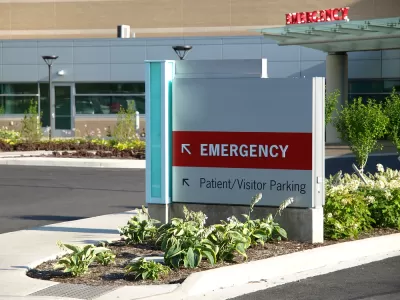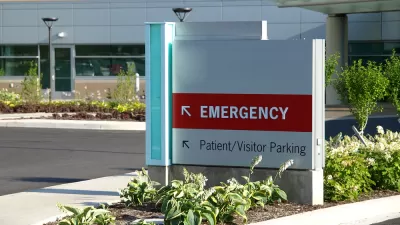Hospitals are uniquely suited to make an impact in the ongoing affordable housing crisis in the United States.

Tracey Walker shares news of an Urban Institute report from earlier this month that provides guidance for nonprofit hospitals and healthcare systems adopting a growing role in affordable housing investments.
Housing investment is relatively new for most hospitals and healthcare systems, according to Walker, but the survey operates from the assumption that "hospitals’ institutional assets, focus on health outcomes, and position as anchor institutions make them well-positioned to invest in affordable housing."
An article on the Urban Institute website by Martha Fedorowicz and Kathryn Reynolds published in April also credits policy changes initiative by the Affordable Care Act with some of the new housing initiatives by the healthcare industry.
Walker parses out the key findings of the survey results published in August in a list, including a list of three concrete ways hospitals and healthcare systems can support housing investments:
- Donating land or buildings or swapping land with a housing developer;
- Using their financial position to enhance credit or lowering borrowing costs, or provide a direct loan for construction, renovation, or rehabilitation costs; and
- Contributing staff time or capital to encourage others to invest in affordable housing development.
For more background and context for the survey, see also another Urban Institute article written by Mathew Eldridge, along with Fedorowicz and Reynolds, to supplement the release of the survey findings.
FULL STORY: How Can Hospitals Invest in Affordable Housing?

Study: Maui’s Plan to Convert Vacation Rentals to Long-Term Housing Could Cause Nearly $1 Billion Economic Loss
The plan would reduce visitor accommodation by 25,% resulting in 1,900 jobs lost.

Alabama: Trump Terminates Settlements for Black Communities Harmed By Raw Sewage
Trump deemed the landmark civil rights agreement “illegal DEI and environmental justice policy.”

Why Should We Subsidize Public Transportation?
Many public transit agencies face financial stress due to rising costs, declining fare revenue, and declining subsidies. Transit advocates must provide a strong business case for increasing public transit funding.

Paris Bike Boom Leads to Steep Drop in Air Pollution
The French city’s air quality has improved dramatically in the past 20 years, coinciding with a growth in cycling.

Why Housing Costs More to Build in California Than in Texas
Hard costs like labor and materials combined with ‘soft’ costs such as permitting make building in the San Francisco Bay Area almost three times as costly as in Texas cities.

San Diego County Sees a Rise in Urban Coyotes
San Diego County experiences a rise in urban coyotes, as sightings become prevalent throughout its urban neighbourhoods and surrounding areas.
Urban Design for Planners 1: Software Tools
This six-course series explores essential urban design concepts using open source software and equips planners with the tools they need to participate fully in the urban design process.
Planning for Universal Design
Learn the tools for implementing Universal Design in planning regulations.
Smith Gee Studio
Alamo Area Metropolitan Planning Organization
City of Santa Clarita
Institute for Housing and Urban Development Studies (IHS)
City of Grandview
Harvard GSD Executive Education
Toledo-Lucas County Plan Commissions
Salt Lake City
NYU Wagner Graduate School of Public Service





























